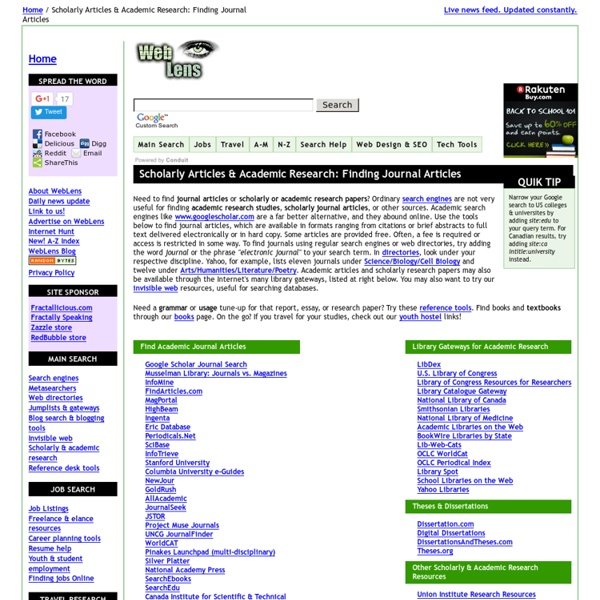



Abstract Management, Conference Management and Research Search Engine OAIster Home Access to OAIster A freely-accessible site for searching only OAIster records is available at Additionally, OAIster records are fully accessible through WorldCat.org, and will be included in WorldCat.org search results along with records from thousands of libraries worldwide. They will also continue to be available on the OCLC FirstSearch service to Base Package subscribers, providing another valuable access point for this rich database and a complement to other FirstSearch databases. Contributing to OAIster OAIster continues to grow and expand. You can do self-service harvesting, which means you set your own harvest schedule and customize your metadata map for collections, Your library's holdings can be set in WorldCat, Your organization's unique collections receive maximum visibility via WorldCat and the WorldCat Gateway, which is available at no charge, and Your metadata will be syndicated wherever WorldCat data is syndicated.
Free Academic Open Access Books, Journals and Research Papers Rad Research Oxford Open | Oxford Open OUP Supports Open Access Oxford University Press (OUP) is mission-driven to facilitate the widest possible dissemination of high-quality research. We embrace both green and gold open access (OA) publishing to support this mission. A Proven Track Record of Success OUP has been publishing OA content since 2004. We have also successfully launched or taken over high-quality OA titles, including: Genome Biology and Evolution, Journal of Legal Analysis, Progress of Theoretical and Experimental Physics, and Database. OUP facilitates green OA either by allowing authors to deposit versions of their manuscripts in institutional or subject repositories after a specified time period, or depositing the version of record on their behalf. Supporting the Evolution of Open Access Publishing Sustainable, high-quality OA publishing requires either funding to be available to pay for Article Processing Charges, sponsorship, or suitable embargo periods. Oxford Journals operates two different open access models:
Flashcards: The world's largest library of printable flash cards Welcome to Cogprints Rome: Map of Trade Routes Rome Project for 6th Grade Social Studies Welcome This site is a collection of “Rome resources” for the The Dalton School community. Anyone interested in Classical Rome will find this site to be a valuable research tool. As the site is very large, the resources are divided into several categories: (Click on the appropriate button below or on links at right to view desired resource list .) Cogent OA Is Impact Factor here to stay? The digital age provides a platform for research and researchers as never before. Open access publishing facilitates global readership and a wide exposure for your work. With our partnership with Altmetric.com, we bring you enhanced article-level metrics so you can track who reads, shares and cites your work, and from where. By simply clicking on the Altmetric badge you can now see the progress and real impact of your work. See the mentions from newspapers, magazines, blogs, social media and policy documents, as well as comments on post publication peer review sites. Given the high and visible levels of engagement through this new tool, Altmetric can be considered alongside the traditional journal Impact Factor, in light of a changing world. Find out more
Empire, Oil, and Disaster - blog about my new book 100 Time-Saving Search Engines for Serious Scholars (Revised) Back in 2010, we shared with you 100 awesome search engines and research resources in our post: 100 Time-Saving Search Engines for Serious Scholars. It’s been an incredible resource, but now, it’s time for an update. Some services have moved on, others have been created, and we’ve found some new discoveries, too. Many of our original 100 are still going strong, but we’ve updated where necessary and added some of our new favorites, too. General Need to get started with a more broad search? iSEEK Education: iSeek is an excellent targeted search engine, designed especially for students, teachers, administrators, and caregivers. Meta Search Want the best of everything? Dogpile: Find the best of all the major search engines with Dogpile, an engine that returns results from Google, Yahoo! Databases and Archives Resources like the Library of Congress have considerable archives and documents available, and many of them have taken their collections online. Books & Journals Science Math & Technology